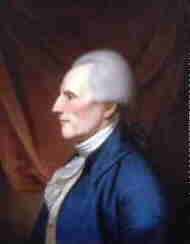 SKC Films Library SKC Films Library |
| SKC Films Library >> American History >> United States: General History and Description >> Revolution to Civil War, 1775/1783-1861 >> Individual Biography, A-Z |
 Richard Henry Lee Richard Henry Leedrafter of the resolution that led to the Declaration of Independence Richard Henry Lee was born at Stratford Hall, Westmoreland County, Virginia, on January 20, 1732. He received his early education from private tutors, completed his education in England, and returned to America in 1752. In 1758, Lee was appointed Justice of the Peace of Westmoreland County, and in the same year was elected to the Virginia House of Burgesses, in which he served until 1775. His first speech was in strong opposition to slavery, which he proposed eventually to abolish by imposing a heavy tax on all further importation. Lee was especially active in Virginia's campaign of resistance to the Stamp Act and Townshend Acts. In 1768, in a letter to John Dickinson of Pennsylvania, he suggested a private correspondence among the Friends of Liberty in the different colonies, and in 1773 he became a member of the Virginia Committee of Correspondence. In 1774, Virginia sent Lee as a delegate to the First Continental Congress, where he prepared the address to the people of British America, and the second address to the people of Great Britain. At this time he favored a policy of economic pressure on the British government, but by late 1775 he favored complete independence. On June 7, 1776, as a delegate to the Second Continental Congress, Lee introduced the famous resolutions: (1) "that these united Colonies are, and of right ought to be, free and independent States, that they are absolved from all allegiance to the British Crown, and that all political connection between them and the State of Great Britain is, and ought to be, totally dissolved"; (2) "that it is expedient to take the most effectual measures for forming foreign alliances"; and (3) "that a plan of confederation be prepared and transmitted to the respective Colonies for their consideration and approbation." The first resolution was adopted on July 2, and the Declaration of Independence was adopted two days later. Lee was in Congress from 1774 to 1780; a member of the Virginia House of Delegates in 1777, 1780-1784 and 1786-1787; and was in Congress again from 1784 to 1787, including a stint as president of that body from 1784 to 1786. Though opposed to the Constitution because of what he regarded as its infringements upon the independent power of the States, he accepted election as one of the first U.S. Senators from Virginia in hope of bringing about amendments he believed necessary. It was Lee who proposed what became the 10th Amendment: "The powers not delegated to the United States by the Constitution, nor prohibited by it to the States, are reserved to the States respectively, or to the people." Lee retired from public life in 1792, and died at Chantilly, his estate in Westmoreland County, on June 19, 1794. INTERNET SOURCE SEE ALSO |
| SKC Films Library
>> American History
>> United
States: General History and Description >> Revolution to Civil War, 1775/1783-1861 >> Individual Biography, A-Z This page was last updated on June 18, 2017. |